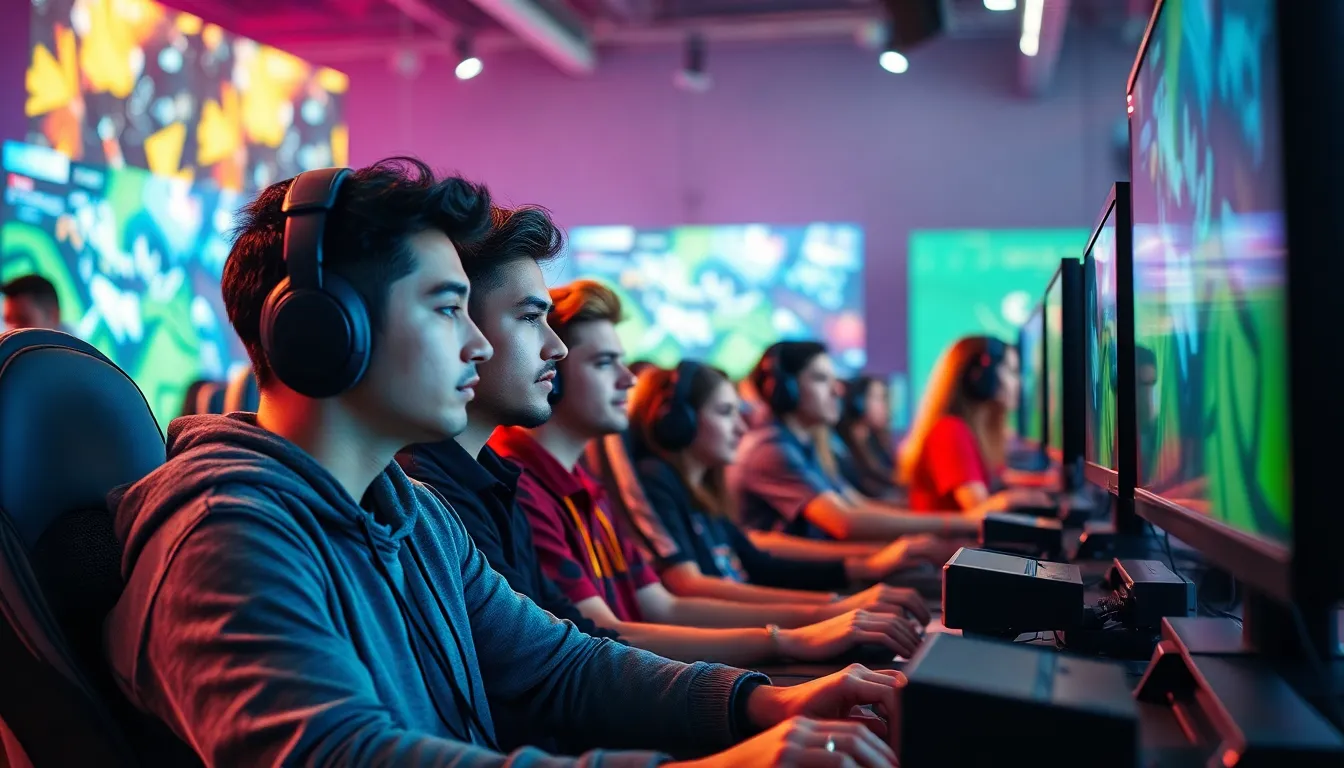Imagine athletes in sleek tracksuits, but instead of running marathons, they’re furiously clicking away on keyboards. Welcome to the world of esports, where competition meets digital prowess. As gaming continues to explode in popularity, the question on everyone’s mind is: should esports be included in the Olympics?
Picture it: a gold medal for the ultimate champion of League of Legends or a podium finish in Fortnite. It’s not just about who can press buttons the fastest; it’s about strategy, teamwork, and yes, a little bit of gaming magic. With millions of fans worldwide, esports could bring a fresh vibe to the Olympic arena. So, is it time for the Olympic torch to be passed to the digital realm? Let’s dive into this pixelated debate and explore the future of esports in the Olympics.
Table of Contents
ToggleOverview of Esports
Esports represent a new frontier in competitive entertainment, evolving into a global phenomenon with millions of players and spectators. The competitive nature of gaming parallels traditional sports, showcasing individual and team skills across various titles. Games like League of Legends, Fortnite, and Dota 2 dominate the landscape, providing platforms for players to demonstrate their prowess.
The evolution of esports has led to substantial growth in viewership and sponsorship. In 2022, esports attracted over 500 million viewers globally, reflecting a rising trend. Major tournaments offer prize pools that often exceed millions of dollars, turning top gamers into household names. The rapid expansion of esports organizations further solidifies its importance in the entertainment industry.
Team dynamics play a significant role in success. Effective communication, strategy, and teamwork elevate performance during high-stakes competitions. Professional players engage in rigorous training schedules, similar to athletes in traditional sports, emphasizing the need for dedication and practice.
Furthermore, esports transcends geographic boundaries. Players and fans connect through online platforms, creating a diverse and inclusive community. This widespread engagement enhances its appeal, drawing in various age groups and demographics. Social media and streaming platforms like Twitch facilitate real-time interaction, adding another layer to the experience.
The inclusion of esports in the Olympics poses interesting implications for the future. As the Olympic Committee explores this possibility, discussions about accessibility, recognition, and legitimacy continue. This digital evolution reflects broader cultural shifts, inviting further considerations about competition and athleticism in the modern world.
Historical Context

Esports has quickly ascended as a powerful player in the competitive landscape, challenging how sporting events are perceived. The evolution of gaming into a global spectacle has changed the dynamics of live entertainment.
Rise of Esports
The rise of esports is characterized by substantial growth in popularity and viewership. In 2022, esports reached an audience of over 500 million people, showcasing remarkable engagement worldwide. Major tournaments feature prize pools sometimes exceeding millions of dollars, making professional gaming lucrative. Competitive gaming attracts talent from diverse backgrounds, creating a rich, inclusive community. Gamers develop skills that mirror those of traditional athletes, including teamwork, strategy, and perseverance. With the advent of streaming platforms like Twitch, fans engage with players in real-time, enhancing the esports experience.
Previous Olympic Games and Esports
Previous Olympic Games indicated a reluctance to include esports as an official sport, despite its burgeoning popularity. The 2020 Tokyo Olympics hosted an esports event as part of the Olympic Virtual Series, reflecting growing interest. This virtual series featured various games but didn’t grant full Olympic recognition to esports. Discussions surrounding the inclusion of esports have intensified, particularly as the global landscape shifts. Organizers have weighed various factors including audience engagement, skill demonstration, and the cultural significance of competitive gaming. While no definitive decision has emerged, ongoing conversations suggest a potential path forward for esports within the Olympic framework.
Arguments For Inclusion
Esports merit discussion for Olympic inclusion due to their global appeal and relevance among audiences.
Global Popularity
The immense popularity of esports is evident in the staggering 500 million viewers in 2022. Worldwide tournaments attract participants from various countries, showcasing diverse talent. Major titles like League of Legends and Dota 2 draw millions, generating substantial fan engagement and media coverage. Prize pools in these competitions often exceed millions of dollars, solidifying esports as a viable competitive platform. Online streaming platforms amplify reach, enabling fans to connect with players in real time. This shift not only highlights the growing viewer base but also creates potential for inclusivity within the Olympic framework. Global interest in esports expands, making it a compelling option for the Games.
Youth Engagement
Youth engagement in esports signifies a crucial aspect of modern culture. Gamers aged 18 to 34 constitute a significant portion of the esports audience, energizing communities through online platforms. Participation fosters teamwork, strategy, and skill development, paralleling the principles found in traditional sports. Many young fans view esports athletes as role models, reflecting aspirations within this new era of competition. High school and college teams across various regions promote esports, offering scholarships and educational opportunities. This demographic shift towards interactive entertainment creates pathways for further engagement, positioning esports favorably for Olympic consideration. Their enthusiasm could rejuvenate the Olympic spirit, illustrating the evolving landscape of athletic competition.
Arguments Against Inclusion
Debates about esports’ inclusion in the Olympics highlight several key concerns. Traditionalists often argue that the core values of the Olympics focus on physicality and athletic prowess. Sports like running and swimming embody discipline, endurance, and physical exertion, which many believe esports lack. Critics note that rather than relying on physical skill, esports prioritize mental agility, making comparisons challenging.
Concerns about legitimacy also surface in discussions around esports. Many doubt whether competitive gaming can be classified as a sport, citing the absence of universally recognized governing bodies like FIFA or the International Olympic Committee. Historical resistance to esports stems from perceptions of gaming as a leisure activity rather than a serious competition. Critics emphasize that the mental exertion involved in gaming doesn’t align with traditional definitions of athleticism, leaving a significant gap in acceptance within the Olympic community.
Current Status of Esports in the Olympics
Esports continues to gain traction within the Olympic context, reflecting its rising status in the global sporting landscape. Major events and discussions keep surfacing, showcasing the ongoing interest in officially incorporating esports into the Olympic framework.
Recent Developments
In 2021, the Olympic Virtual Series marked a significant milestone, providing a platform for esports titles like Gran Turismo and Just Dance. This initiative brought attention to the potential for more integration in future Olympic Games. Decision-makers and stakeholders actively engage in dialogues, exploring how to enhance viewer experiences while recognizing the skill involved in esports. The International Olympic Committee (IOC) is looking toward future inclusivity, appealing to a younger audience while evaluating what esports can bring to traditional sporting events.
Future Potential
The future of esports in the Olympics hinges on evolving attitudes toward competitive gaming. Several factors, including audience engagement and cultural significance, play a role in shaping potential inclusion. Demographics reveal that young gamers, particularly those aged 18 to 34, represent a crucial audience segment eager for recognition. Exciting developments, like potential partnerships with gaming organizations, could pave the way for deeper integration. An inclusive approach might not only rejuvenate the Olympic spirit but also encourage a broader acceptance of esports as a legitimate component of athletic competition.
The conversation around esports in the Olympics is gaining momentum as the landscape of competitive gaming continues to evolve. With its massive global audience and the skill required to excel, esports presents a compelling case for inclusion in this prestigious event.
As traditional views on athleticism shift, the potential for esports to attract younger audiences and foster inclusivity becomes increasingly relevant. The ongoing discussions and initiatives by the International Olympic Committee show a willingness to explore this new frontier.
Whether esports will find its rightful place in the Olympic Games remains to be seen, but the excitement and engagement surrounding it suggest that the future may hold significant opportunities for both esports and the Olympics.


